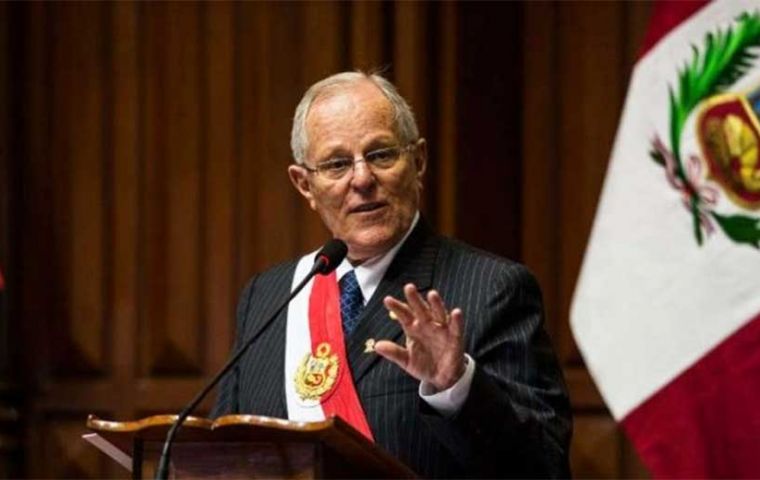MercoPress. South Atlantic News Agency
Former Peruvian President PPK banned from leaving the country
 The trial against PPK is expected to begin in the coming months
The trial against PPK is expected to begin in the coming months Former Peruvian President Pedro Pablo Kuczynski (PPK) was kept from departing to the United States at Lima's Jorge Chávez International Airport during the weekend, before an 18-month travel ban was imposed on him. His lawyers contend that immigration authorities cannot act ex officio, deeming the 86-year-old politician a flight risk.
PPK said he planned to undergo some medical check-ups and reunite with his wife, Nancy Lange, whom he has not seen in seven years. Judge Margarita Salcedo's prohibition was a compromise ruling to the prosecution's 36-month request.
The former head of State faces charges of aggravated money laundering, procedural fraud, and false declaration related to his 2016 campaign, including allegations of receiving over US$ 100,000 from a company tied to the “Construction Club” through “smurfing” and payments from Odebrecht through proxy companies Westfield Capital and First Capital.
PPK’s defense called the airport detention an “administrative kidnapping,” claiming no prior court order existed, and filed a habeas corpus writ, alleging a constitutional violation.
PPK's lawyer Juan Midolo argued that no court order restricted PPK’s travel by the time he intended to board the flight, calling the action by Immigration officials an unconstitutional “factual impediment.” Salcedo's decision was signed the following day, effective until Dec. 2026.
The habeas corpus seeks to lift immigration alerts and hold responsible parties accountable, asserting that only a judge can restrict freedom of transit.
“We are trying to set a precedent that Migrations is not constitutionally empowered to restrict the freedom of transit; only a judge can do it,” he argued. “What we are requesting is that all immigration alerts be lifted and also that those responsible be determined,” Midolo explained.
The incident has heightened scrutiny of political corruption in Peru, where other former presidents like Alejandro Toledo and Ollanta Humala have faced similar legal battles.
The case has sparked debate over balancing individual rights with accountability for high-level officials, with public opinion divided between viewing the measure as necessary or as judicial persecution. The outcome of PPK’s case is seen as a potential precedent for addressing corruption among former Peruvian leaders.




Top Comments
Disclaimer & comment rulesCommenting for this story is now closed.
If you have a Facebook account, become a fan and comment on our Facebook Page!